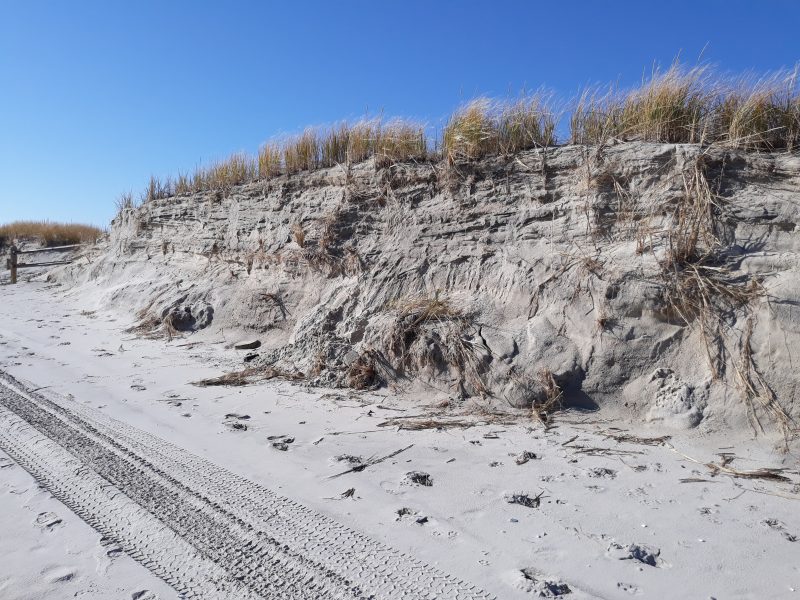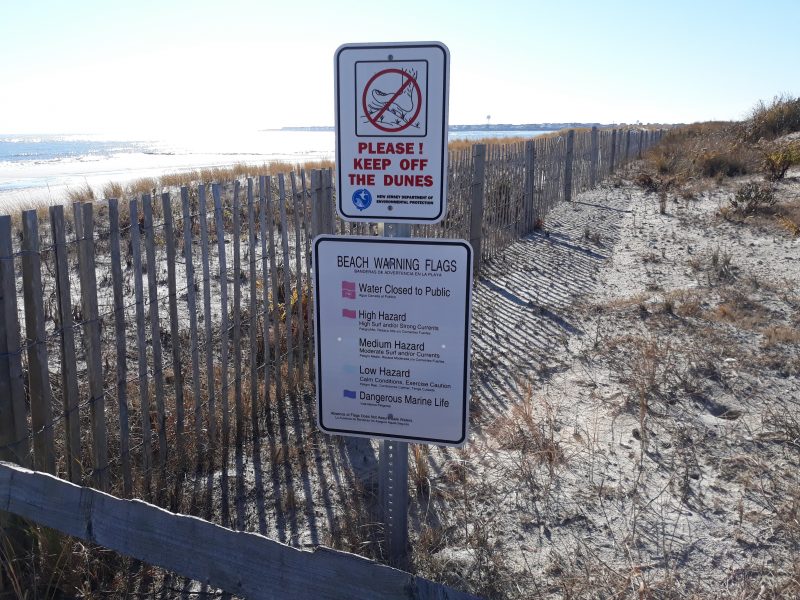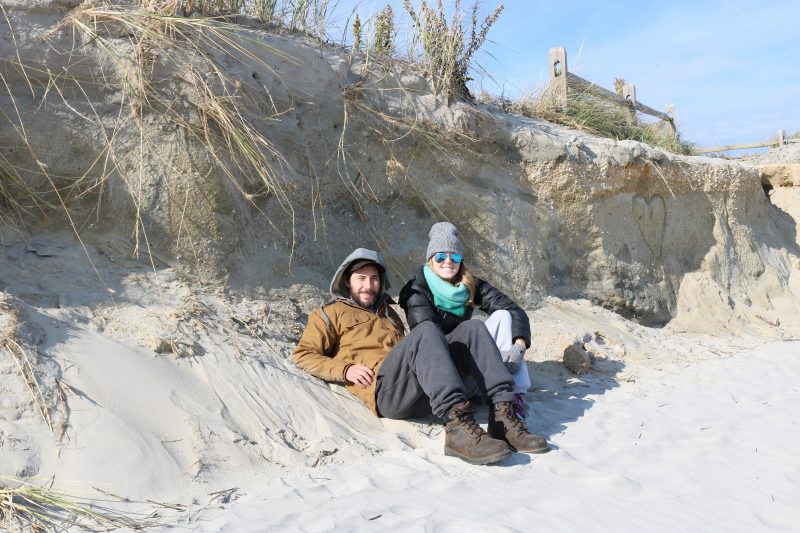Sand fencing helps to stabilize the dunes.
 By DONALD WITTKOWSKI
Beachgoers shouldn’t be alarmed if they see surveying markers with pink ribbons tied to them sticking out of the dunes.
They were placed there by Great Lakes Dredge & Dock Co., the company hired by the U.S. Army Corps of Engineers to replenish Sea Isle City’s storm-eroded beaches.
Surveying is part of the preliminary work before full-fledged dredging operations begin this spring to pump a total of 760,000 cubic yards of new sand onto the beaches in two parts of town.
Plans call for 510,000 cubic yards of sand to be deposited on the beaches from about 75th Street to 93rd Street in Townsends Inlet.
Another 250,000 cubic yards of sand will freshen up the beaches from around 28th Street to 53rd Street.
Even more sand may be coming, depending on the results of the surveying operations to determine just how seriously Sea Isle’s beaches have been eroded, according to the Army Corps of Engineers.
About 20,000 cubic yards of sand per day will be pumped onto the beaches. There will be pipes on the beaches in May and part of June during the work, but the contractor can close no more than 1,000 feet of shoreline at one time while the project is being done, City Business Administrator George Savastano explained in an earlier interview.
By DONALD WITTKOWSKI
Beachgoers shouldn’t be alarmed if they see surveying markers with pink ribbons tied to them sticking out of the dunes.
They were placed there by Great Lakes Dredge & Dock Co., the company hired by the U.S. Army Corps of Engineers to replenish Sea Isle City’s storm-eroded beaches.
Surveying is part of the preliminary work before full-fledged dredging operations begin this spring to pump a total of 760,000 cubic yards of new sand onto the beaches in two parts of town.
Plans call for 510,000 cubic yards of sand to be deposited on the beaches from about 75th Street to 93rd Street in Townsends Inlet.
Another 250,000 cubic yards of sand will freshen up the beaches from around 28th Street to 53rd Street.
Even more sand may be coming, depending on the results of the surveying operations to determine just how seriously Sea Isle’s beaches have been eroded, according to the Army Corps of Engineers.
About 20,000 cubic yards of sand per day will be pumped onto the beaches. There will be pipes on the beaches in May and part of June during the work, but the contractor can close no more than 1,000 feet of shoreline at one time while the project is being done, City Business Administrator George Savastano explained in an earlier interview.

The project will also include restoring the dunes and beach fencing in some parts of town.
Most of the replenishment contract involves widening the beaches. However, in some areas, the dunes, beach access points and sand fencing will be repaired.
“Our beaches are our greatest natural resource, and as everyone knows, they’re in need of replenishment in the downtown area and at the south end,” Mayor Leonard Desiderio said during his annual State of the City address on Feb. 11.
Desiderio noted in his remarks that the good news is that Great Lakes Dredge & Dock is expected to arrive in late April to perform the beach restoration work prior to the summer season.
“Currently, they are planning to start at the south end and will complete that area first before proceeding to the center of town,” he said.
Sea Isle is part of a $32.5 million beach replenishment project that also includes Strathmere and Ocean City. There are options in the contract for even more sand if needed, which could increase the cost of the project to $41.3 million.
The project will be funded mostly by the Army Corps of Engineers and the New Jersey Department of Environmental Protection. The three towns will each kick in a smaller share. Savastano said Sea Isle’s contribution should be less than $2 million.
Great Lakes will anchor a ship offshore from Sea Isle to dredge sand from a “borrow area.” The sand will be pumped from the dredge through a network of massive pipes to the beaches to give them a fresh look just in time for the arrival of summer tourists.

Steve and Tess Protesto, of Media, Pa., lounge on the sand at the base of the eroded dunes in November.
Beach restoration will begin in the south end first so that it may be completed before environmental restrictions take effect to protect endangered birds that make their nests in that part of Sea Isle.
Least terns, a tiny shorebird, create a nesting colony on a scruffy patch of sand on the beach at 94th Street in Townsends Inlet from May to August under the protection of the NJDEP.
Sea Isle suffered significant beach erosion in some spots during a lingering coastal storm that unleashed a series of unusually high tides over a four-day period in early October.
During the storm, huge chunks of sand were sliced away from the dunes, leaving cliff-like walls in some areas. Some beaches appeared bare – stripped of their powdery top layer of sand. Wooden dune fencing was torn to shreds.
Even before the October storm, beaches and dunes in Townsends Inlet between 88th and 92nd streets had suffered significant erosion. The sand dunes, in particular, were sheared away by the churning surf, creating jagged cliffs more than 10 feet high.
 By DONALD WITTKOWSKI
Beachgoers shouldn’t be alarmed if they see surveying markers with pink ribbons tied to them sticking out of the dunes.
They were placed there by Great Lakes Dredge & Dock Co., the company hired by the U.S. Army Corps of Engineers to replenish Sea Isle City’s storm-eroded beaches.
Surveying is part of the preliminary work before full-fledged dredging operations begin this spring to pump a total of 760,000 cubic yards of new sand onto the beaches in two parts of town.
Plans call for 510,000 cubic yards of sand to be deposited on the beaches from about 75th Street to 93rd Street in Townsends Inlet.
Another 250,000 cubic yards of sand will freshen up the beaches from around 28th Street to 53rd Street.
Even more sand may be coming, depending on the results of the surveying operations to determine just how seriously Sea Isle’s beaches have been eroded, according to the Army Corps of Engineers.
About 20,000 cubic yards of sand per day will be pumped onto the beaches. There will be pipes on the beaches in May and part of June during the work, but the contractor can close no more than 1,000 feet of shoreline at one time while the project is being done, City Business Administrator George Savastano explained in an earlier interview.
By DONALD WITTKOWSKI
Beachgoers shouldn’t be alarmed if they see surveying markers with pink ribbons tied to them sticking out of the dunes.
They were placed there by Great Lakes Dredge & Dock Co., the company hired by the U.S. Army Corps of Engineers to replenish Sea Isle City’s storm-eroded beaches.
Surveying is part of the preliminary work before full-fledged dredging operations begin this spring to pump a total of 760,000 cubic yards of new sand onto the beaches in two parts of town.
Plans call for 510,000 cubic yards of sand to be deposited on the beaches from about 75th Street to 93rd Street in Townsends Inlet.
Another 250,000 cubic yards of sand will freshen up the beaches from around 28th Street to 53rd Street.
Even more sand may be coming, depending on the results of the surveying operations to determine just how seriously Sea Isle’s beaches have been eroded, according to the Army Corps of Engineers.
About 20,000 cubic yards of sand per day will be pumped onto the beaches. There will be pipes on the beaches in May and part of June during the work, but the contractor can close no more than 1,000 feet of shoreline at one time while the project is being done, City Business Administrator George Savastano explained in an earlier interview.
 The project will also include restoring the dunes and beach fencing in some parts of town.
Most of the replenishment contract involves widening the beaches. However, in some areas, the dunes, beach access points and sand fencing will be repaired.
The project will also include restoring the dunes and beach fencing in some parts of town.
Most of the replenishment contract involves widening the beaches. However, in some areas, the dunes, beach access points and sand fencing will be repaired.
 Steve and Tess Protesto, of Media, Pa., lounge on the sand at the base of the eroded dunes in November.
Beach restoration will begin in the south end first so that it may be completed before environmental restrictions take effect to protect endangered birds that make their nests in that part of Sea Isle.
Least terns, a tiny shorebird, create a nesting colony on a scruffy patch of sand on the beach at 94th Street in Townsends Inlet from May to August under the protection of the NJDEP.
Sea Isle suffered significant beach erosion in some spots during a lingering coastal storm that unleashed a series of unusually high tides over a four-day period in early October.
During the storm, huge chunks of sand were sliced away from the dunes, leaving cliff-like walls in some areas. Some beaches appeared bare – stripped of their powdery top layer of sand. Wooden dune fencing was torn to shreds.
Even before the October storm, beaches and dunes in Townsends Inlet between 88th and 92nd streets had suffered significant erosion. The sand dunes, in particular, were sheared away by the churning surf, creating jagged cliffs more than 10 feet high.
Steve and Tess Protesto, of Media, Pa., lounge on the sand at the base of the eroded dunes in November.
Beach restoration will begin in the south end first so that it may be completed before environmental restrictions take effect to protect endangered birds that make their nests in that part of Sea Isle.
Least terns, a tiny shorebird, create a nesting colony on a scruffy patch of sand on the beach at 94th Street in Townsends Inlet from May to August under the protection of the NJDEP.
Sea Isle suffered significant beach erosion in some spots during a lingering coastal storm that unleashed a series of unusually high tides over a four-day period in early October.
During the storm, huge chunks of sand were sliced away from the dunes, leaving cliff-like walls in some areas. Some beaches appeared bare – stripped of their powdery top layer of sand. Wooden dune fencing was torn to shreds.
Even before the October storm, beaches and dunes in Townsends Inlet between 88th and 92nd streets had suffered significant erosion. The sand dunes, in particular, were sheared away by the churning surf, creating jagged cliffs more than 10 feet high.